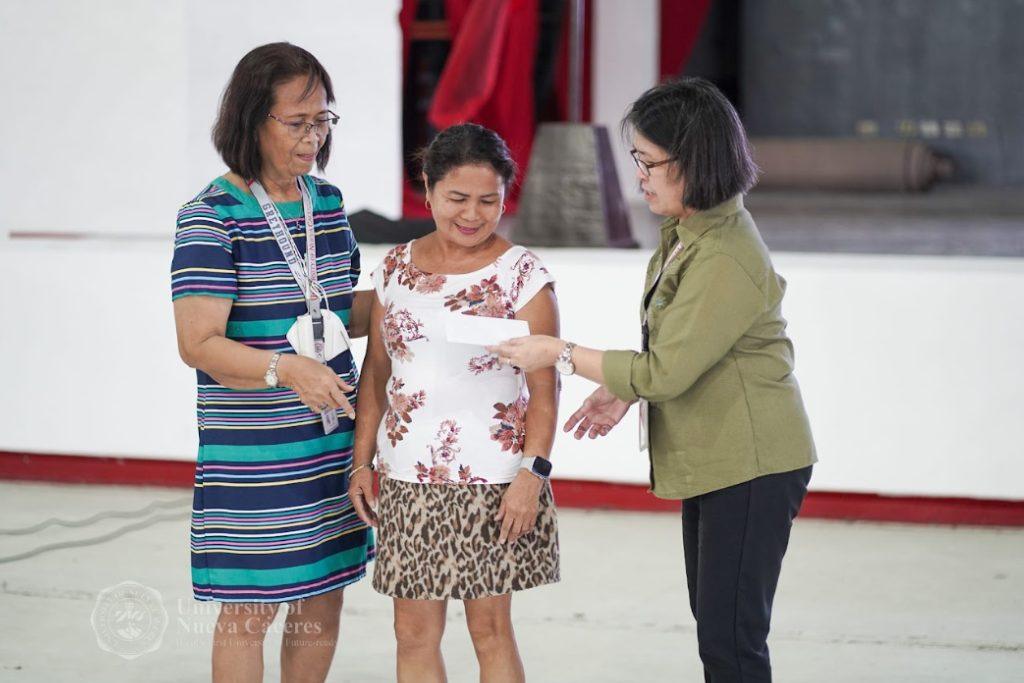
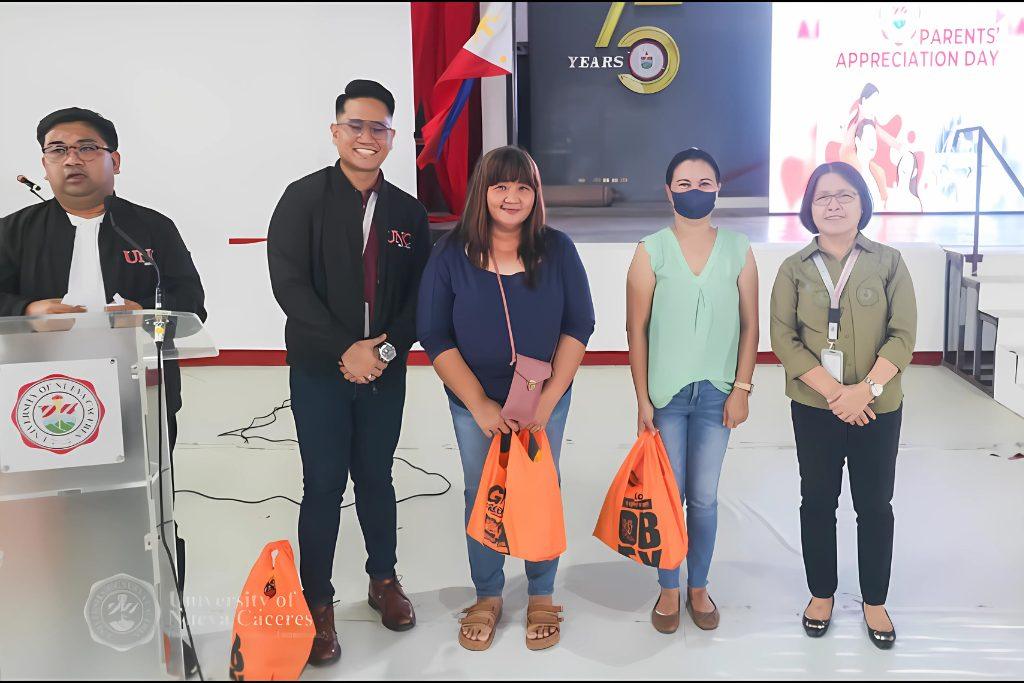
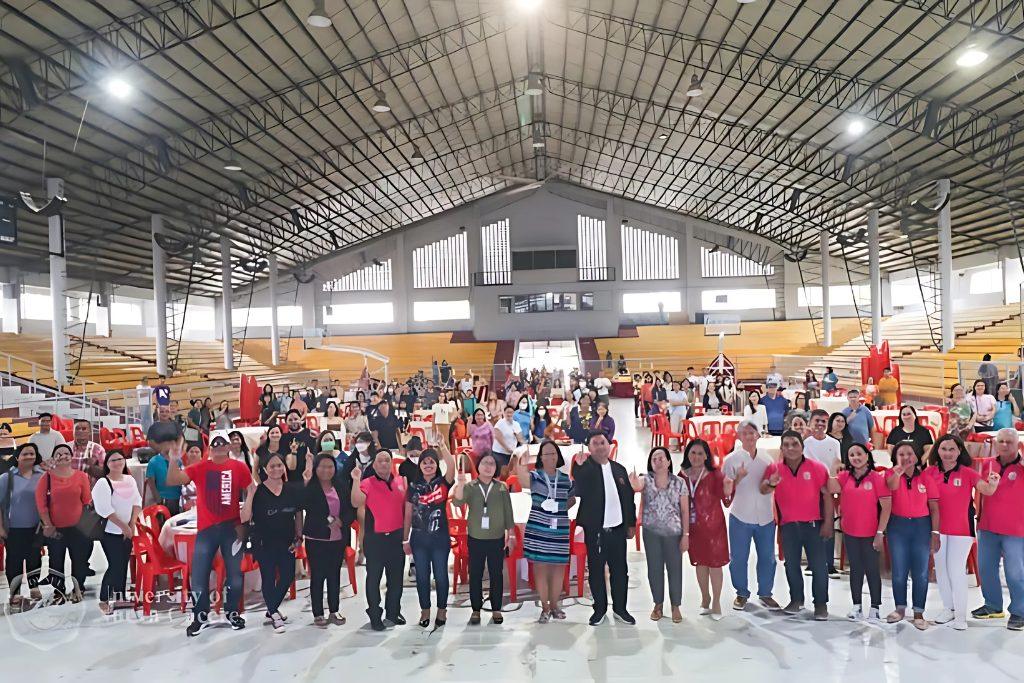
Continue to UNC Enrollment Requirements Page.
Step 1: Fill out the online application form
Get started by completely filling out the online application form. Makikita mo ito when you go to the official UNC website, click ‘Join UNC’ from the main tabs, and choose the ‘Freshmen/Readmission/Transferees’ from the dropdown menu. Or you can simply scroll through the front page and click on the ‘Apply Now!’ button.
Some important reminders:
At this point of the application, you’ll only be asked basic questions about your student information, previous school, and some family information. That’s it!
Once you submit the form, a pre-registration number will be sent to your email address. Take note of this since gagamitin mo ito sa buong enrollment process.
Once your application has been approved via email, pwede ka nang magbayad ng optional reservation fee to secure your enrollment slot. In the same email, you’ll be redirected to the UNC online enrollment system (OES) page para kumpletuhin ang online enrollment mo. This is where you can do Steps 2 to 5!
Step 2: Choose subjects
Once you’re done with Step 1, your enrollment process gets a whole lot easier. Kung incoming freshman, first-year transferee or re-enrollee ka, pwede ka nang pumili ng mga subjects na gusto mong kunin based on the available course offerings. Take note that only subjects available for your block will appear!
Step 3: Reserve classes
Not sure yet with your final subject lineup for the sem? Okay lang yan. Reserve mo muna… but not for too long. According to UNC policy, meron kang at least 3 days to keep your reserved schedules and finalize your classes. Do it asap!
Step 4: Pay your fees
After finalizing your list of classes, pwede ka nang magbayad ng matriculation fees mo. UNC makes this step easy, safe, and convenient with a wide range of payment options to choose from! Bukod sa pagbabayad onsite sa teller’s office, you can also try:
Pro-tip: The school recommends paying via ECPay since pwede mo itong magamit directly sa enrollment confirmation page. Less extra steps, more seamless experience!
Step 5: Secure printout
When you’re all set and done with payment and final class schedule for the sem, pwede mo nang makuha ang Certificate of Matriculation mo from the UNC OES portal. Just select the ‘Printout’ tab and then click the ‘Secure Official Printout’ button. This paper officially makes you an enrolled UNC student for 1st sem, S.Y. 2021-2022. Congrats!
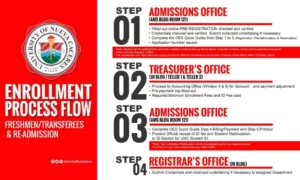
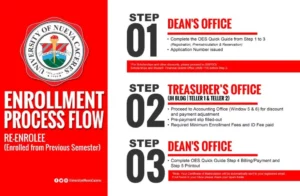
UNC offers different modes of payment for your convenience! It can be made not only through on-site campus transactions but also through mobile banking and transfers, bayad/collection centers, and banks.
1. For Upon Enrollment Fee please upload your proof of payment to your OES Account
2. For Tuition Fee (Pre-lim,Mid-term,Semi-Finals and Finals) Payment please upload your proof of payment to your Student Portal.
Follow these simple steps to pay your tuition fee using the GCash App:
1. Open GCash APP
2. Choose Pay Bills
3. Under Biller Categories, choose Schools
4. Choose University of Nueva Caceres from the list of schools that will appear on the screen.
5. Fill-out the needed info and proceed with payment. P20 charge will be added on top of the amount entered for payment.
Follow these simple steps to pay your tuition fee using the PayMaya App:
1. Open the PayMaya App.
2. Choose Pay Biils.
3. Under Biller Catergories, choose Schools
4. Choose University of Nueva Caceres from the list of schools that will appear on screen.
5. Fill out the needed Info such as Application Number/Student ID Number, Complete Name and Amount.
**Biller Convience Fee (BCF) may apply.**
The University of Nueva Caceres announces the resumption of the limited Face-to- Face Classes in all of its programs this School Year 2022-2023 using three delivery designs for incoming freshmen and upperclassmen across levels.
The entire academic community shall adapt the following delivery designs to promote inclusivity, safety and flexibility. Moreover, these designs are based on the preference and contexts of the majority of the students across academic units and the guidance of the Commission on Higher Education, Legal Education Board and Department of Education
1) The Blended Flexi-Kit learning modality is self-directed learning through physical modules with in-campus face-to-face classes. F2F meetings shall be spent for Coaching, Synthesis, Laboratory work and Assessments. The schedule for such meetings will be determined by the faculty depending on the number of students enrolled and the contexts of the students.
The College of Business and Accountancy shall follow this modality for five (5) of its programs.
2) All other programs shall be implemented using the Blended Flexi-tech learning modality. This modality is a blend of the face-to-face classes and learning through online materials which are available either in the Learning Management System (LMS), or Coursera Platform. It is the combination of online synchronous meetings and on site classes. Face-to-face meetings shall be spent for Laboratory work and/or Assessments.
All Higher Education programs including School of Law and School of Graduate Studies shall implement this modality by conducting on-site classes/synchronous meetings and/or industry immersion following the class schedules. The faculty shall determine the frequency of the on-site and synchronous meetings based on the
nature of the course and the context of the students.
The Basic Education programs (i.e. Elementary to Senior High School) shall implement this modality by conducting on-site classes which may range from 3 days to maximum of five (5) days a week and the remaining class time shall be spent for
online synchronous meetings/coaching and self directed online modules. The Principals of the Basic Education Units in consultation with the parents shall announce the specific face-to-face schedules and how these shall be combined with the LMS asynchronous sessions.
3) The Hybrid learning modality is a new delivery system to be piloted starting this school year. The class shall be divided into two groups but will be met on the same class time schedule by the faculty handling the subject. One group will be met on site and the other group online. The students who are on site are those who usually have weak internet connection.
Selected courses (mainly board courses) in the Colleges of Education, Business and Accountancy and Engineering and Architecture programs shall be delivered using this modality.
To request for your credentials please follow these steps.
1.Fill out: Request for School Record Forms (For Onsite)
or
Email: [email protected]
Subject: Request of Credentials
Name of Requestor:
Student ID Number:
Department:
Purpose of Request:
Document Type:
Via Email (For Online)
2. Verify Clearance
3. Pay for the requested credentials
4. Submit accomplished Request for School Record Forms
5. Preparation of Requested Documents
6. Release of Requested Credentials.
TOR valid for Employment: 110.00
Documentary Stamp: 36.00
Honorable Dismissal: 110.00
TOR: 110.00
Documentary Stamp: 72.00 (36.00 each)
STEPS:
A. Accessing your account using a Web Browser:
1. Open a Web Browser e.g. Mozilla, IE, Firefox, or Safari (for Apple products)
2. In the URL Field type http://www.gmail.com, then in the GMAIL Page, in the Username field, type your email address. Example Username: [email protected]
3. Then, in the Password field, type your STUDENT ID, then click NEXT.
B. Accessing Using Mobile App
1. Open Gmail App
2. Add the email address
3. Skip Android device Policy
4. Install Google Device Policy
5. Skip Work Profile
6. Set the PIN/Security
7. Then Go back to Gmail App, then click the email address you have added and enter your password
C. Changing your password:
1. Click the UNC Logo at the upper left corner of the page.
2. Click Manage your Google Account
3. Click on Security, then to proceed.
4. Type your existing password for verification, then Type the NEW PASSWORD
For Visual Guide Click Here
Step 1: Login to your G-Suite Email Account by entering your email address as username, then Next for password.
Step 2: Click on your Profile Photo (upper right part of the screen) and Click “MANAGE YOUR ACCOUNT”
Step 3: Click the “SECURITY BUTTON” and “RECOVERY PHONE” or ”RECOVERY EMAIL”
Step 4: Input your G Suite Email Password, then click “NEXT”.
Step 4.1 (Email): Click the “ADD RECOVERY EMAIL” button, then type your other email and “DONE” button.
Step 4.2 (Phone): Click the “ADD RECOVERY PHONE” button.
Step 5: Key in your active phone number then click “NEXT”
Step 6: To verify if it is your active number, click “GET CODE”
Step 7: Check your phone. You will receive a verification via SMS.
Step 8: Enter the verification code sent to your phone and click “VERIFY”.
Step 9: After verification, your phone number will be added for recovery.
For Visual Guide Click Here
Lost or Forgot Password?
You don’t need to request or report your G Suite Email password to the ICT office. Just click “Forgot Password?” in the Gmail login page, and you will receive a verification code through your recovery mobile phone or email to verify if it’s really you who are trying to access your account.
Step 1: Open a Browser, enter the UNC BB Page. >> https://unc.blackboard.com
Step 2: Click on “FORGOT PASSWORD”
Step 3: Select USERNAME OR EMAIL ADDRESS OPTION.
Step 4: Click “SUBMIT” then check your email.
For additional support please, please send email to [email protected] and [email protected] with the following details;
Student ID#:
Complete Name:
Course:
For Visual Guide Click Here
Step 1. Register
Begin your application process by going to the Bukas site at app.bukas.ph/intro. Input your OES number in lieu of your ID number. Register your personal mobile number to receive a OTP code for verification.
Step 2. Set up and complete your profile
Fill in the information needed to complete Bukas profile. It is recommended to complete all the details before submitting an application for higher chances of approval.
In the profile creation step, we will be asking for the following details:
Basic Information – Fill in the required fields in this portion completely and correctly. Make sure the mobile number inputted of the student/applicant is their personal number and can be contacted as this is how Bukas will get in touch with the student for updates on your application.
Student’s Email Address – Make sure the inputted email is their personal email. An email to verify this email address.
Review all the information inputted, edit if needed, and click SUBMIT.
Step 3. Verification
Upload ID
Make sure when UPLOADING or TAKING photo from device of the ID, it is not CROPPED or BLURRY and document clearly show your ID. Name and ID number should be clearly visible. Issues with ID will cause delays in processing. List of Accepted Valid ID
ID should be readable and face should be fully seen. Do not cover any part of the ID or face. Make sure it is a clear copy.
Step 4. Selecting your preferred Bukas All-In Plan
Indicate how much coverage you need: 1,000 PHP- 50,000 PHP
Choose your payment plan: 4 Months at 0% interest or 12 Monhts at 1% Interest.
Proof of Address
Make sure that your address is the same with the address stated on our profile. Uploaded or taken photos should not be blurry. Name and address must be seen clearly. List of Valid Proof Residence
Guardian Information
Guardian can be parent or someone who’s taking care of the student who is residing in the Philippines. He/She should be at least 21 years old and willing to be the emergency contact and must have a contactable number and email address.
Guarantor Information
Guarantor will be the one helping to finance the student’s education.
*Note: It is highly encouraged to submit Proof of Income. List of Valid Proof of Income
Step 5. Confirm your Bukas All-In Plan
Students will receive and email and SMS on the status of their application. Once approved, the student need to login and CONFIRM the installment plan. No disbursement will be made without the student’s confirmation.
Step 6. Coordination w/ UNC regarding the approved plan
Once the student has confirmed the installment plan, Bukas will coordinate approved amount to UNC in order to validate that the student is enrolled after 2-3 business days. Notification will be sent to your email.
Elementary Department
ANGELYN MONTAÑEZ
0970 388 4118 – [email protected]
Junior High School Department
AMELIA MARTICIO
0912 800 9178 – [email protected]/[email protected]
Senior High School Department
ARVIN SIBULO
0907 986 1518 – [email protected]
College of Engineering and Architecture
KRISTINE TUNAY
0963 503 6619 – [email protected]
College of Education
ROMEO LAYONES
0951 749 8996 – [email protected]
College of Arts and Science
ALLIAH TANDOG
0970 388 4108 – [email protected]
College of Criminology
RENEL FRANCINE TAYAG
0970 388 4122 – [email protected]
College of Nursing
ANGELIKA CLARE DE LA CRUZ – College of Nursing
0970 491 5004- [email protected]
MARLENE DAGCUTAN – Caregiving NC II
09232340972 – [email protected]
College of Business and Accountancy
MARIBEL BALLON
0963 203 9151 – [email protected]
College of Computer Studies
JUNE ARREB DANILA
0970 491 5026 / 0991 554 5277 – [email protected]
School of Law
CHRISTY OLIQUINO
0970 388 4119 – [email protected]
School of Graduate Studies
LORIE DELOS REYES
0970 388 4120 – [email protected]
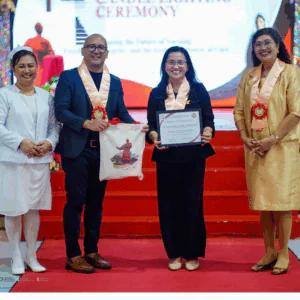



1. Upon graduation the Alumni shall possess the intelectual qualities,interpersonal skills and technical competence to make them a quality graduate and globally competitive.
2. Throughout his/her time as a professional Nurse they will continously grow dynamically and professionaly will update with the trends and challenges in Nursing.
1. Apply knowledge of physical, social, natural science and humanities in the practice of nursing in accordance with existing laws, legal, ethical and moral principles.
2. Utilize the nursing process in performing safe, appropriate and holistic care to individuals, families, population groups and communities observing the core value of a nurse.
3. Apply guidelines and principles of evidence based practice in the delivery of care.
4. Practice beginning management and leadership skills using the system approach, and be able to produce research with an experienced researcher in nursing and other related fields.
5. Communicate and work effectively in collaboration with inter-, intra-, and multidisciplinary and multi-cultural teams.
6. Engage in life- long learning, incorporating evidence-based practice both national and global developmental issues innovating the health care system.
7. Develop entrepreneurial and techno-intellegent skills in delivery of health-care.

Within three to five years after graduation, graduates of BS Electrical Engineering shall be:
1 Utilize one’s technical expertise in the practice of engineering profession.
2 Advance one’s technical skills through life – long learning engagements.
3 Contribute to nation building assuming leadership responsibilities
Apply knowledge of mathematics and science to solve complex engineering problems;
Develop and conduct appropriate experimentation, analyze and interpret data;
Design a system, component, or process to meet desired needs within realistic constraints such as economic, environmental, social, political, ethical, health and safety, manufacturability. and sustainability, in accordance with standards;
Function effectively on multi-disciplinary and multi-cultural teams that establish goals, plan tasks, and meet deadlines; (based on PQF Level 6 descriptor);
Identify, formulate and solve complex problems in electrical engineering;
Recognize ethical and professional responsibilities in engineering practice;
Communicate effectively with a range of audiences;
Understand the impact of engineering solutions in a global, economic, environmental, and societal context;
Recognize the need for additional knowledge and engage in lifelong learning;
Articulate and discuss the latest developments in the field of electrical engineering; (PQF Level 6 descriptor);
Apply techniques, skills, and modern engineering tools necessary for electrical engineering practice; and
Demonstrate knowledge and understanding of engineering and management principles as a member and/or leader in a team to manage projects in multi-disciplinary environments.
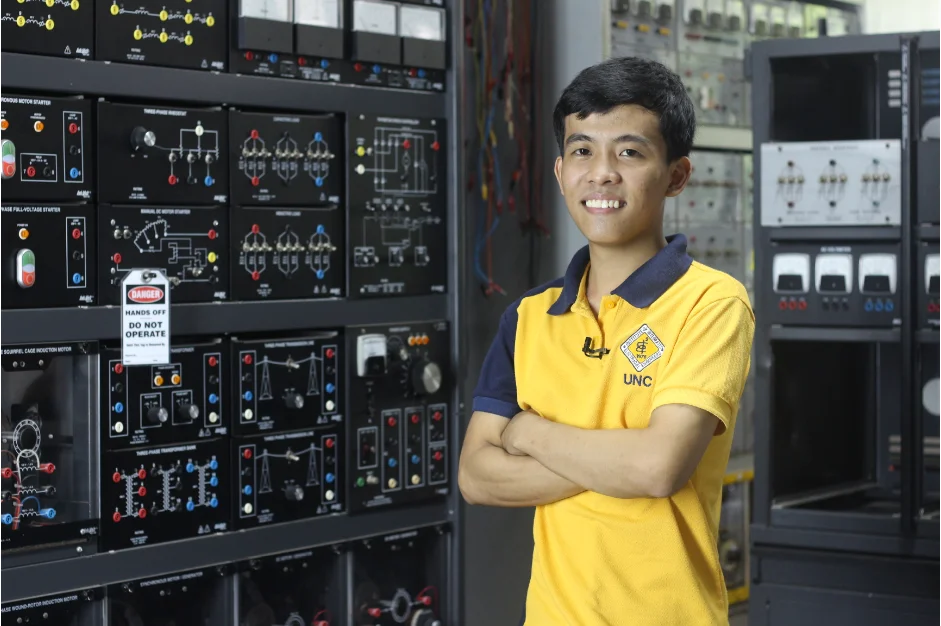
Within three to five years after graduation, graduates of BS Electronics and Communicaitons Engineering shall be:
1. Utilize one’s technical expertise in the practice of engineering profession.
2. Advance one’s technical skills through life – long learning engagements.
3. Contribute to nation building assuming leadership responsibilities.
Apply knowledge of mathematics and science to solve engineering problems;
Design and conduct experiments, as well as to analyze and interpret data;
Design a system, component, or process to meet desired needs within realistic constraints such as economic, environmental, social, political, ethical, health and safety, manufacturability, and sustainability, in accordance with standards
Function on multidisciplinary teams;
Identify, formulate, and solve engineering problems;
Apply professional and ethical responsibility
Communicate effectively
Identify the impact of engineering solutions in a global, economic, environmental, and societal context;
Recognize the need for, and an ability to engage in life-long learning;
Apply knowledge of contemporary issues
Use techniques, skills, and modern engineering tools necessary for engineering practice
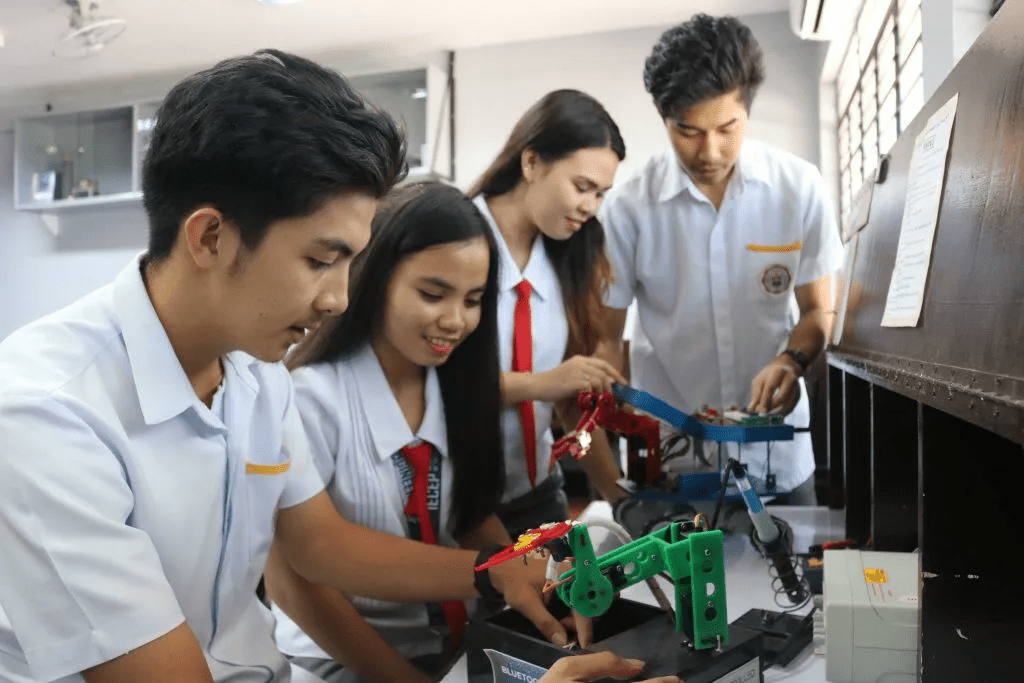
Within three to five years after graduation, graduates of BS Computer Engineering shall be:
1. Utilize one’s technical expertise in the practice of engineering profession.
2. Advance one’s technical skills through life – long learning engagements.
3. Contribute to nation building assuming leadership responsibilities.
Apply knowledge of mathematics and sciences to solve computer engineering problems;
Develop and conduct appropriate experimentation;
Design systems, components, or processes to meet desired needs within realistic constraints, such as economic, environmental, social, political, ethical, health and safety, manufacturability, and sustainability, in accordance with standards;
Function in multidisciplinary and multi-cultural teams;
Solve computer engineering problems;
Recognize professional and ethical responsibility;
Communicate computer engineering activities with the engineering community and with society at large;
Understand the impact of computer engineering solutions in a global, economic, environmental, and societal context;
Recognize the need for life-long learning;
Understand contemporary issues;
Use the appropriate techniques, skills and modern engineering tools necessary for the practice of computer engineering;
Demonstrate knowledge of engineering and management principles as a member and/or leader on projects in mutidisciplinary environments.
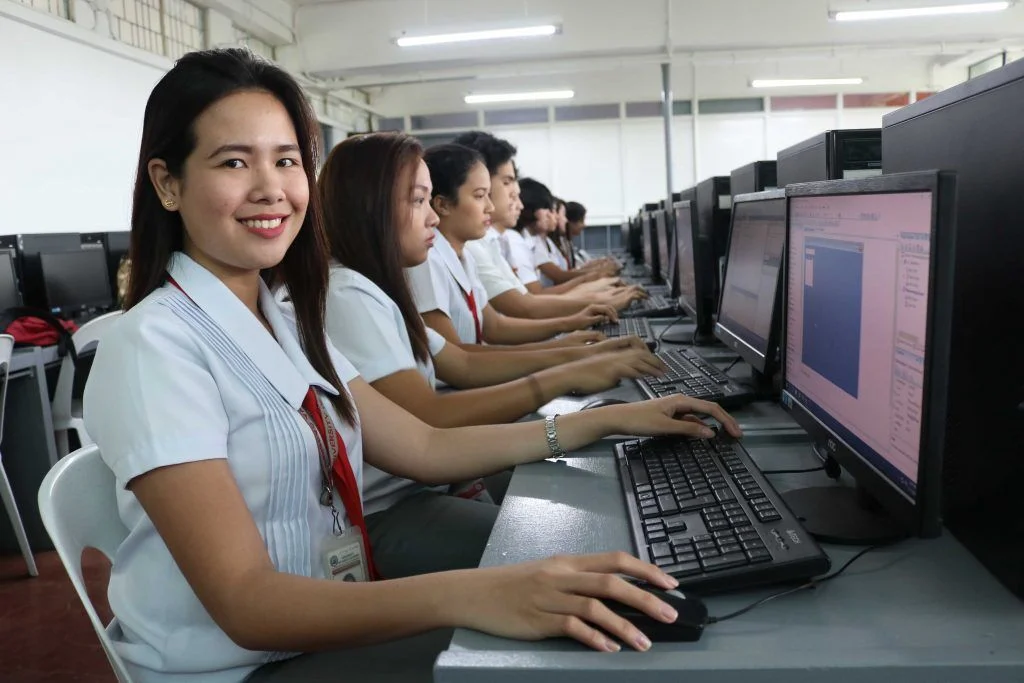
Within three to five years after graduation, graduates of BS Mechanical Engineering shall be:
1. Utilize one’s technical expertise in the practice of engineering profession.
2. Advance one’s technical skills through life – long learning engagements.
3. Contribute to nation building assuming leadership responsibilities.
Apply knowledge of mathematics and sciences to solve electronics engineering problems;
Conduct experiments, as well as to analyze and interpret data;
Design systems, components, or processes to meet desired needs within realistic constraints, such as economic, environmental, social, political, ethical, health and safety, manufacturability, and sustainability, in accordance with standards;
Function in multidisciplinary and multi-cultural teams;
Solve mechanical engineering problems;
Realize professional and ethical responsibility;
Communicate mechanical engineering activities with the engineering community and with society at large;
Know the impact of mechanical engineering solutions in a global, economic, environmental, and societal context;
Recognize the need for, and engage in life-long learning;
Know contemporary issues;
Use the appropriate techniques, skills and modern engineering tools necessary for the practice of mechanical engineering;
Know engineering and management principles as a member and leader of a team, and to manage projects in a multidisciplinary environment;
Know at least one specialized field of mechanical engineering practice.
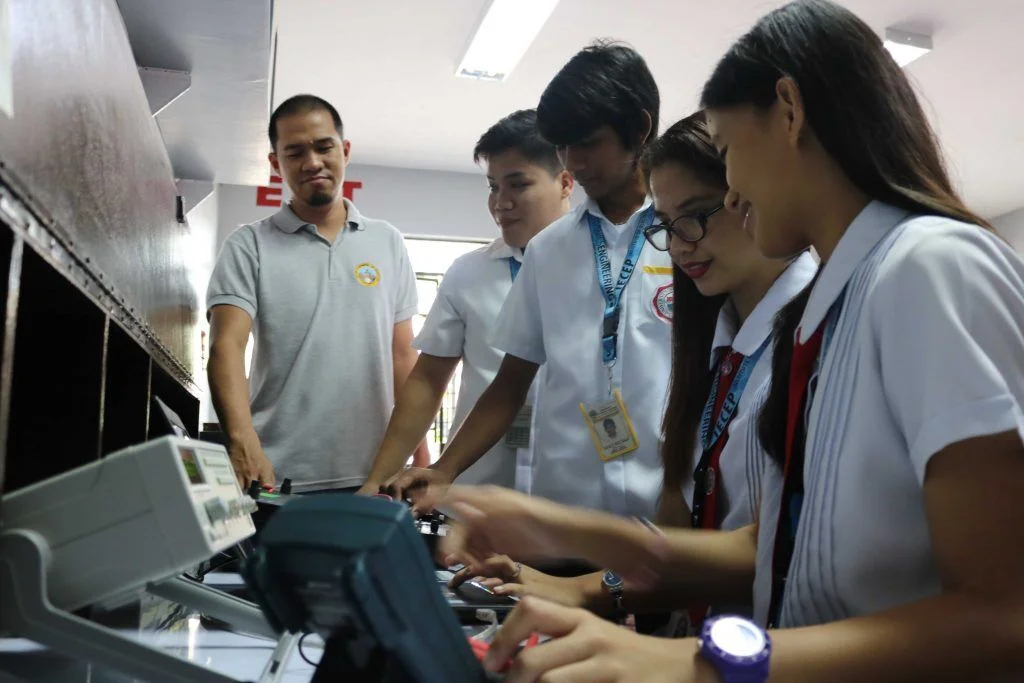
Within three to five years after graduation, graduates of BS Civil Engineering shall be:
1. Utilize one’s technical expertise in the practice of engineering profession.
2. Advance one’s technical skills through life – long learning engagements.
3. Contribute to nation building assuming leadership responsibilities.
Creation of architectural solutions by applying knowledge in history, theory, planning, building technology and utilities, structural concepts and professional practice. (design, BT, UT, PP, ES/AS, HOA/TOA, PLN)
Use of concepts and principles from specialized fields and allied disciplines into various architectural problems. (LA, IA, HC, PLN, EMP, BU 1 -2-3, ES/AS, TOA)
Preparation of contract documents, technical reports, and other legal documents used in architectural practice adhering to applicable laws, standards, and regulations. (DES, PP 1-2-3, BT 3, BU 1-2-3-4-5, HSNG, PLN, ENG3)
Interpretation and application of relevant laws, codes, charters, and standards of architecture and the built environment. (DES, BT 1, HSNG, BU 1-2-3, PLN)
Application of research methods to address architectural problems. (RMA, ENG 3)
Use of various information and communication technology (ICT) media for architectural solutions, presentations and techniques In design and construction. (VT 1-2-3, CADD 1-2)
Acquisition of entrepreneurial and business acumen relevant to Architecture practice. Involvement in the management of construction works and Building administration. (PP, BT, BU, Const. Mgmt. ES/AS)
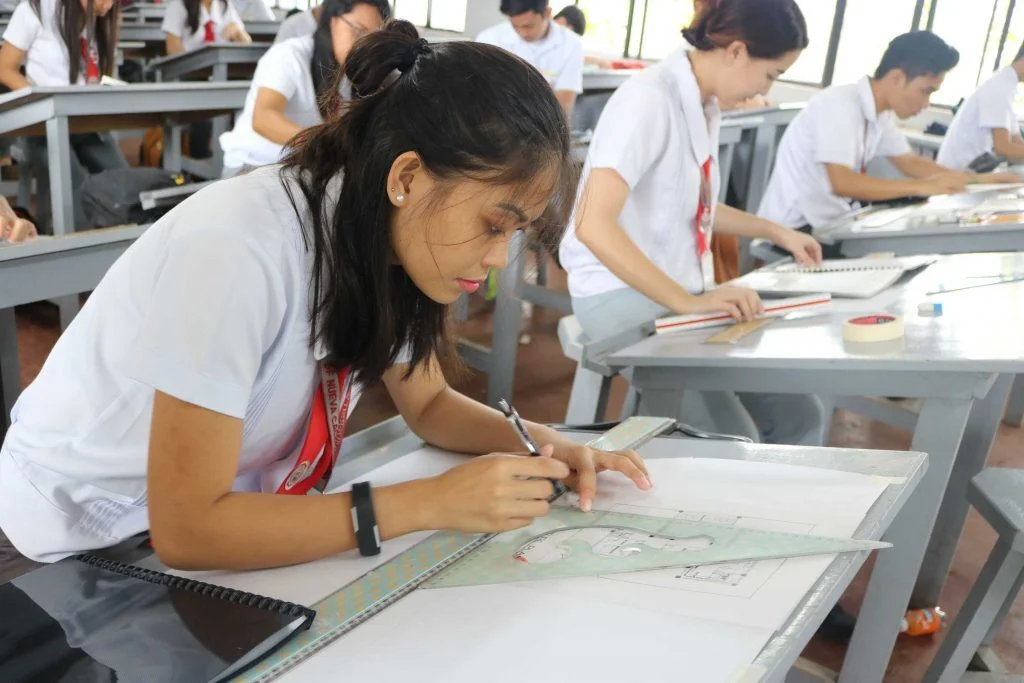
Within three to five years after graduation, graduates of BS Civil Engineering shall be:
1. Utilize one’s technical expertise in the practice of engineering profession.
2. Advance one’s technical skills through life – long learning engagements.
3. Contribute to nation building assuming leadership responsibilities.
a.) Apply knowledge of mathematics and sciences to solve civil engineering problems;
b.) Develop and conduct appropriate experimentation;
c.) Design systems, components, or processes to meet desired needs within realistic constraints, such as economic, environmental, social, political, ethical, health and safety, manufacturability, and sustainability, in accordance with standards;
d.) Function in multidisciplinary and multi-cultural teams;
e.) Solve civil engineering problems;
f.) Recognize professional and ethical responsibility;
g.) Communicate civil engineering activities with the engineering community and with society at large;
h.) Understand the impact of civil engineering solutions in a global, economic, environmental, and societal context;
i.) Recognize the need for life-long learning;
j.) Understand contemporary issues;
k.) Use the appropriate techniques, skills and modern engineering tools necessary for the practice of civil engineering;
l.) Demonstrate knowledge of engineering and management principles as a member and/or leader on projects in mutidisciplinary environments.
m.) Know at least one specialized field of civil engineering practice
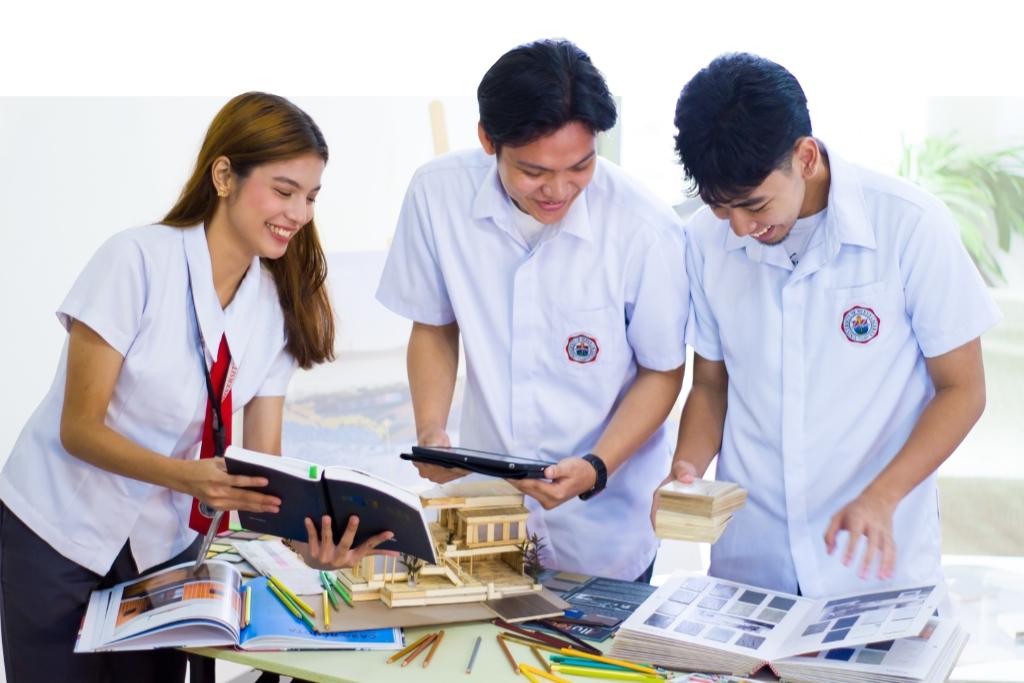
Within three to five years after graduation, graduates of BS Civil Engineering shall be:
1. Utilize one’s technical expertise in the practice of engineering profession.
2. Advance one’s technical skills through life – long learning engagements.
3. Contribute to nation building assuming leadership responsibilities.
a Apply knowledge of mathematics and sciences to solve civil engineering problems;
b Develop and conduct appropriate experimentation;
c Design systems, components, or processes to meet desired needs within realistic constraints, such as economic, environmental, social, political, ethical, health and safety, manufacturability, and sustainability, in accordance with standards;
d Function in multidisciplinary and multi-cultural teams;
e Solve civil engineering problems;
f Recognize professional and ethical responsibility;
g Communicate civil engineering activities with the engineering community and with society at large;
h Understand the impact of civil engineering solutions in a global, economic, environmental, and societal context;
i Recognize the need for life-long learning;
j Understand contemporary issues;
k Use the appropriate techniques, skills and modern engineering tools necessary for the practice of civil engineering;
l Demonstrate knowledge of engineering and management principles as a member and/or leader on projects in multidisciplinary environments.
m Know at least one specialized field of civil engineering practice
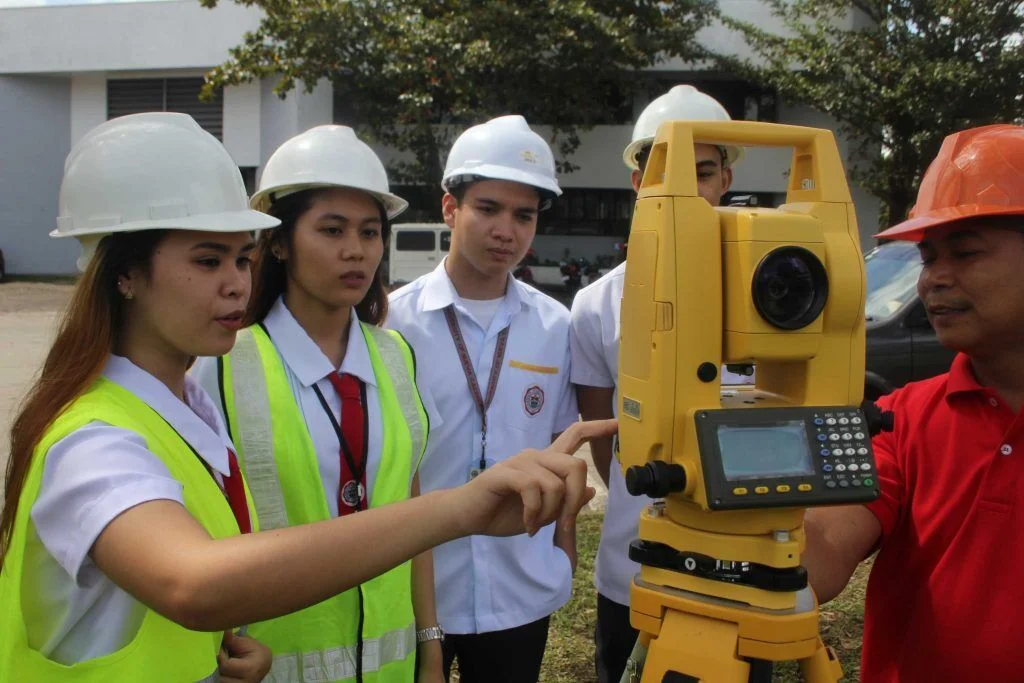
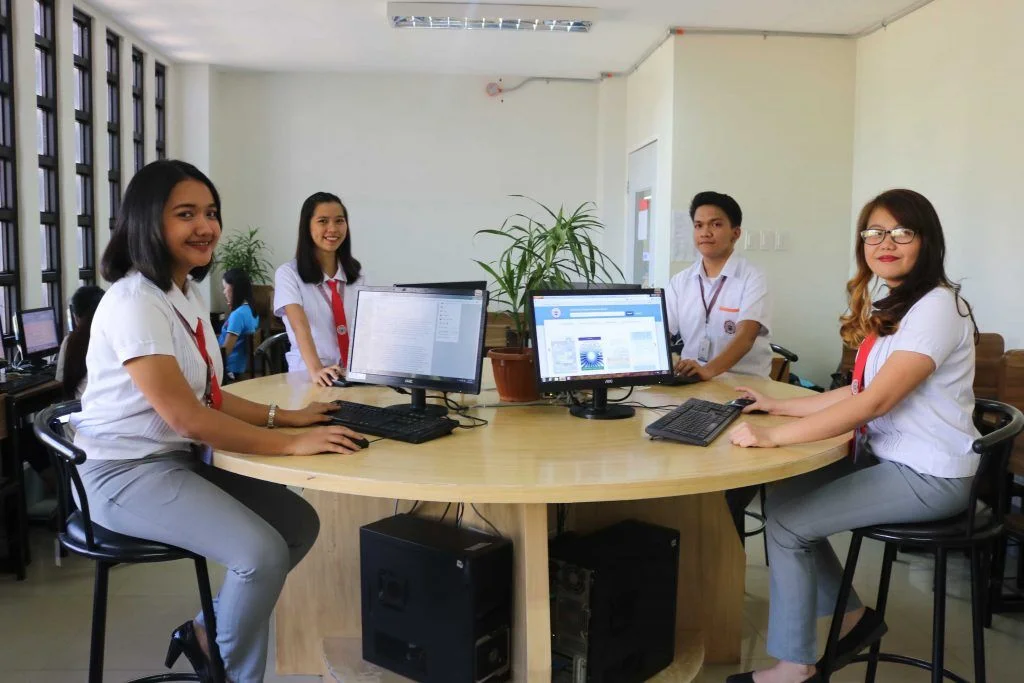
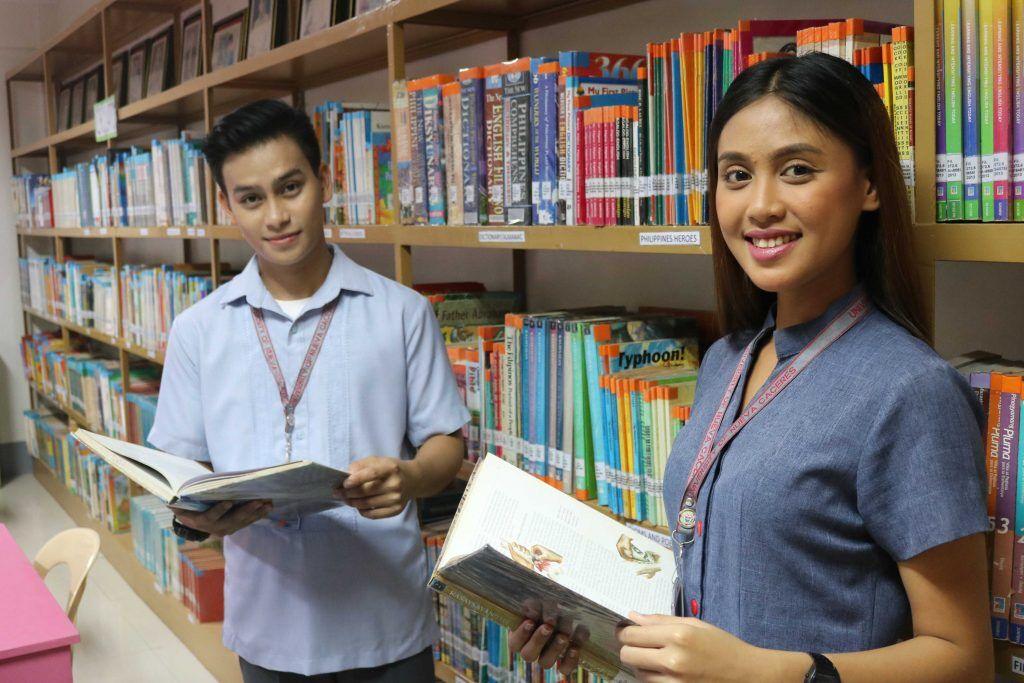
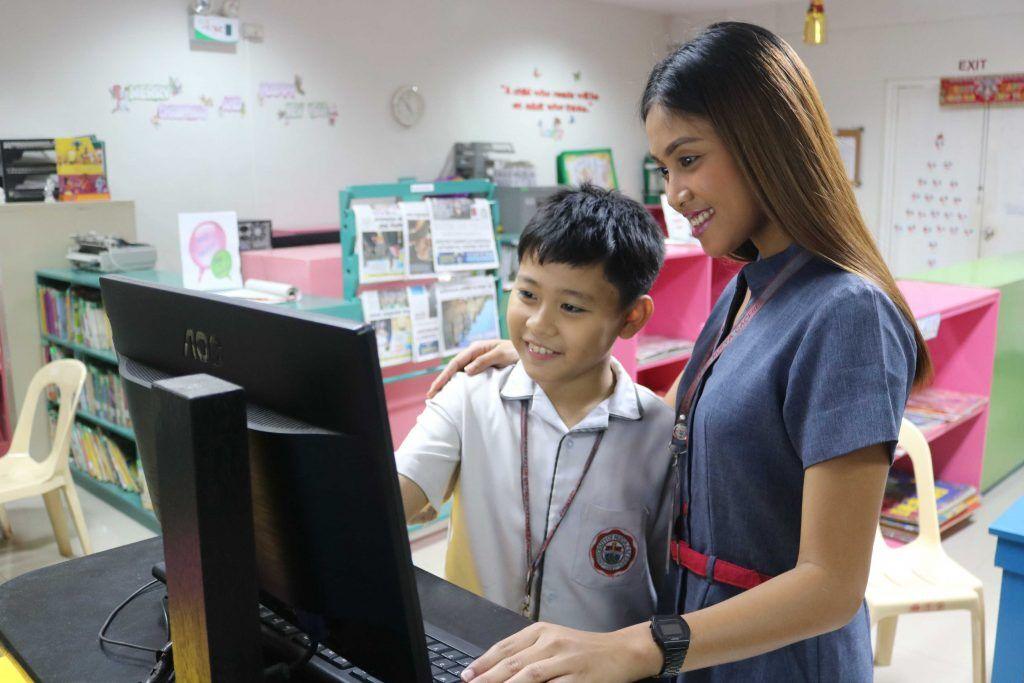
Graduates of the BS Forensic Science program shall be able to:
a. Conduct forensic investigations by applying scientific principles, techniques, and tools to collect, preserve, and analyze physical evidence.
b. Utilize advanced laboratory skills and technologies in forensic biology, forensic chemistry, and other specialized areas to produce accurate and reliable results.
c. Demonstrate critical thinking and problem-solving skills in analyzing and interpreting forensic evidence to support criminal and civil cases.
d. Exhibit a strong understanding of the legal system, including laws, regulations, and ethical guidelines relevant to forensic science.
e. Internalize the importance of ethical behavior, professionalism, and the protection of human rights in the practice of forensic science.
f. Communicate forensic findings effectively in both written and oral formats to diverse audiences, including law enforcement, legal professionals, and the public.
g. Collaborate effectively with multidisciplinary teams in crime scene investigations, laboratory analysis, and judicial processes.
h. Engage in lifelong learning and professional development to stay abreast of advancements in forensic science and technology.
i. Promote public safety and justice by ensuring the accurate application of forensic science in the resolution of criminal cases.
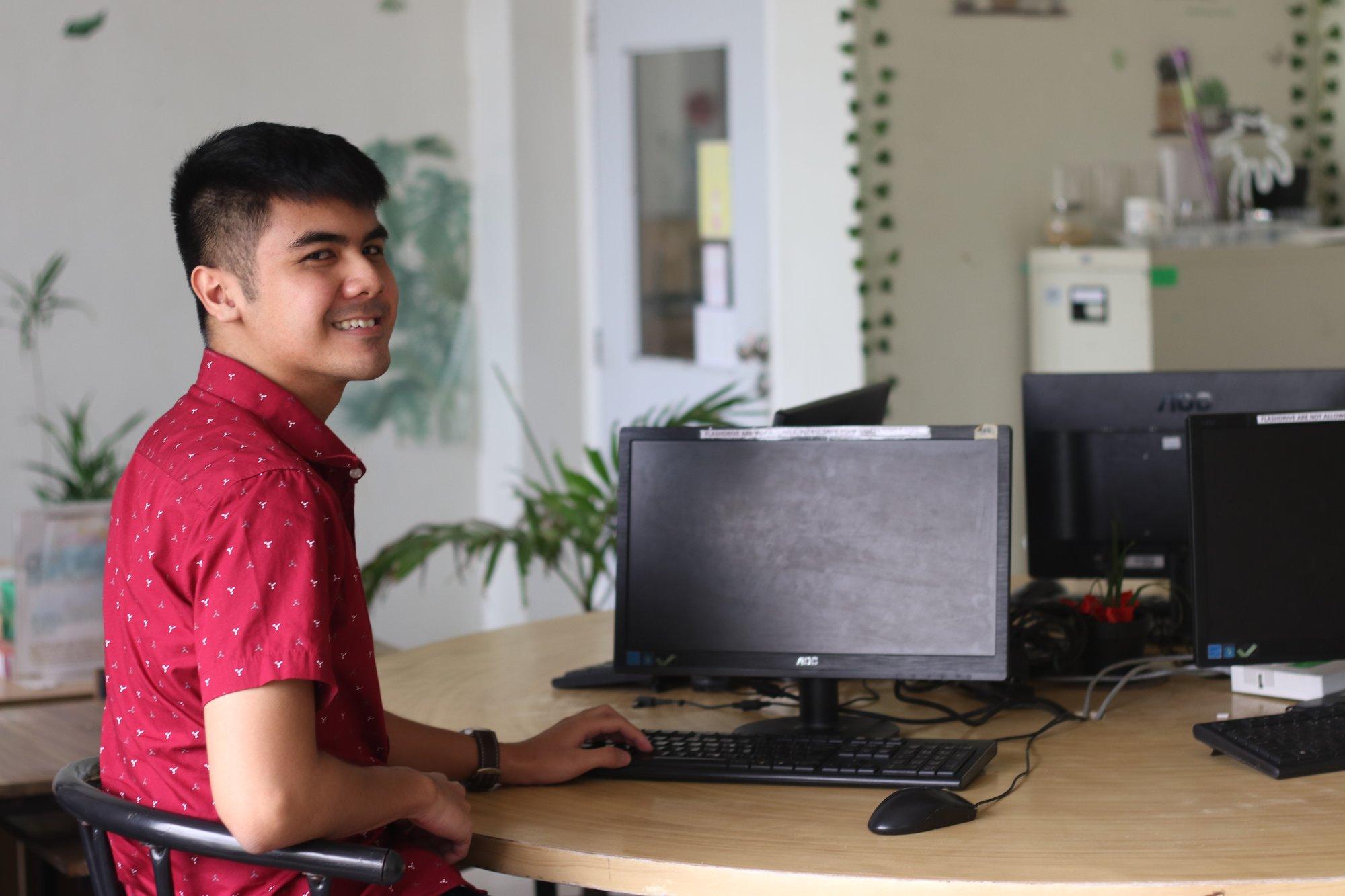
1. Conduct research and inquiry on the nature, causes, treatment, or punishment of criminal behavior and how criminal justice agencies function and respond to crime, criminals and victims.
2. Pactice careers in crime prevention, law enforcement, scientific crime detection, correctional administration, public safety and allied fields.
3. Demonstrate leadership, integrity, honesty, and accountability, while respecting human rights and fostering positive relationships within their community and country.
Graduate of the BS Criminology program equipped with relevant knowledge, skills, attitude and values shall be able to :
a. Conduct criminological research on crimes, crime causation, victims, and offenders to include deviant behavior;
b. Internalize the concepts of human rights and victims welfare;
c. Demonstrate competence and broad understanding in law enforcement administration, public safety, and criminal justice;
d. Utilize criminalistics or forensic science in the investigation and detection of crimes;
e. Apply the principles and jurisprudence of criminal law, evidence, and criminal jurisprudence;
f. Ensure offenders’ welfare and development for their reintegration into the community.

Three to five years after graduation, Master in Library and Information Science graduates are expected to become globally competitive librarians through the aid of continuing education and by gaining leadership responsibilities as guided by the university and the college’s core values.
Upon graduation, the graduate of this program can:

Bachelor of Science in Business Administration major in Financial Management
Bachelor of Science in Business Administration major in Marketing Management
Bachelor of Science in Business Administration major in Human Resource Management
Bachelor of Science in Business Administration major in Operations Management
Bachelor of Science in Business Administration major in Digital Marketing
Practice one’s career as ethically and socially responsible professionals who contribute to uphold the UNC core values
Contribute to nation-building by assuming leadership responsibilities and demonstrating competencies required in Marketing and allied fields.
By the time of graduation, the students of the BSBA program shall have the ability to:
| PO a | Communicate clearly and effectively with stakeholders both in oral and written forms. |
| PO b | Work effectively and independently in multi-disciplinary and multi-cultural teams (PQF level 6 descriptor) |
| PO c | Promote “Filipino historical and cultural heritage” (based on RA 7722) |
| PO d | Act in recognition of personal and professional development |
| PO e | Implement business-related activities by applying the basic functions of management and basic concepts that underlie in each of the functional areas of business (marketing, finance, human resource, production/operation) |
| PO f | Conduct business research, as a tool to critically, analytically and creatively solve problems and drive results |
| PO g | Employ technology as a business tool in capturing financial and non-financial information, generating reports and making decisions. |
| PO h | Apply knowledge and skills to successfully respond to various types of assessments, e.g. certifications. |
| PO i | Analyze the business environment to innovate business ideas based on emerging industry. |
| PO j | Maintain a commitment to good corporate citizenship, social responsibility and ethical practice in the conduct of business or profession. |
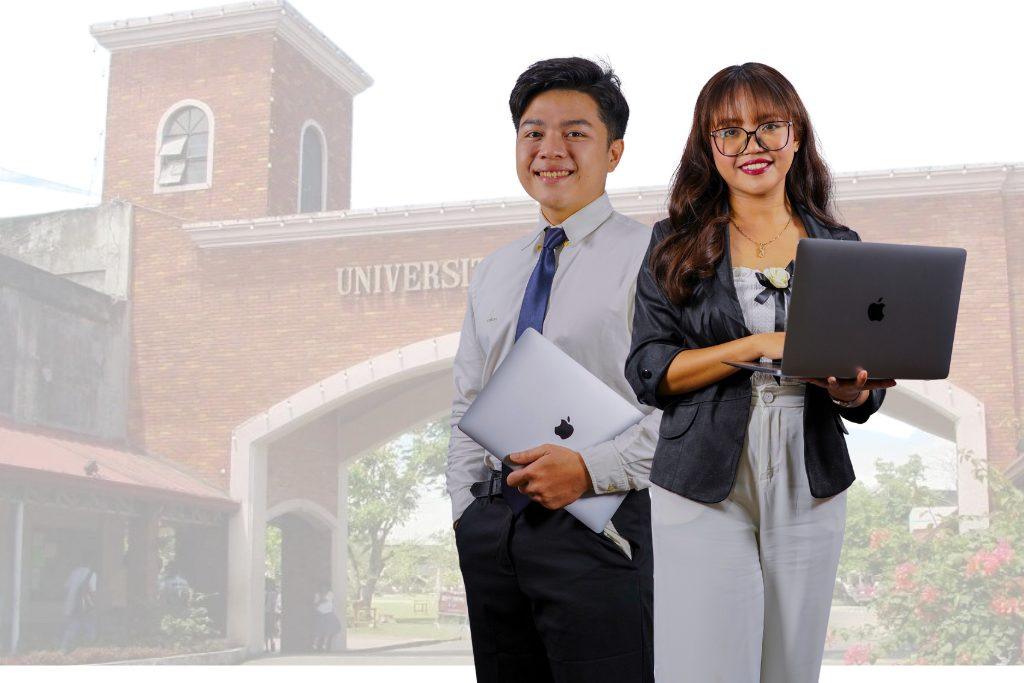
Three to five years after graduation, ACT alumni shall:
PO1: Recognize the need, and have the ability, to engage in independent learning for continual development as a computing professional.
PO2: Effectively communicate orally and in writing using both English and Filipino.
PO3: Work effectively either independently or as a member of a team.
PO4: Act in recognition of professional, social, and ethical responsibility.
PO5: Preserve and promote “Filipino historical and cultural heritage” (based on RA 7722).
PO6: Assist in analyzing complex problems.
PO7: Apply modern computing technologies to solve problems.
PO8: Develop computing solutions.
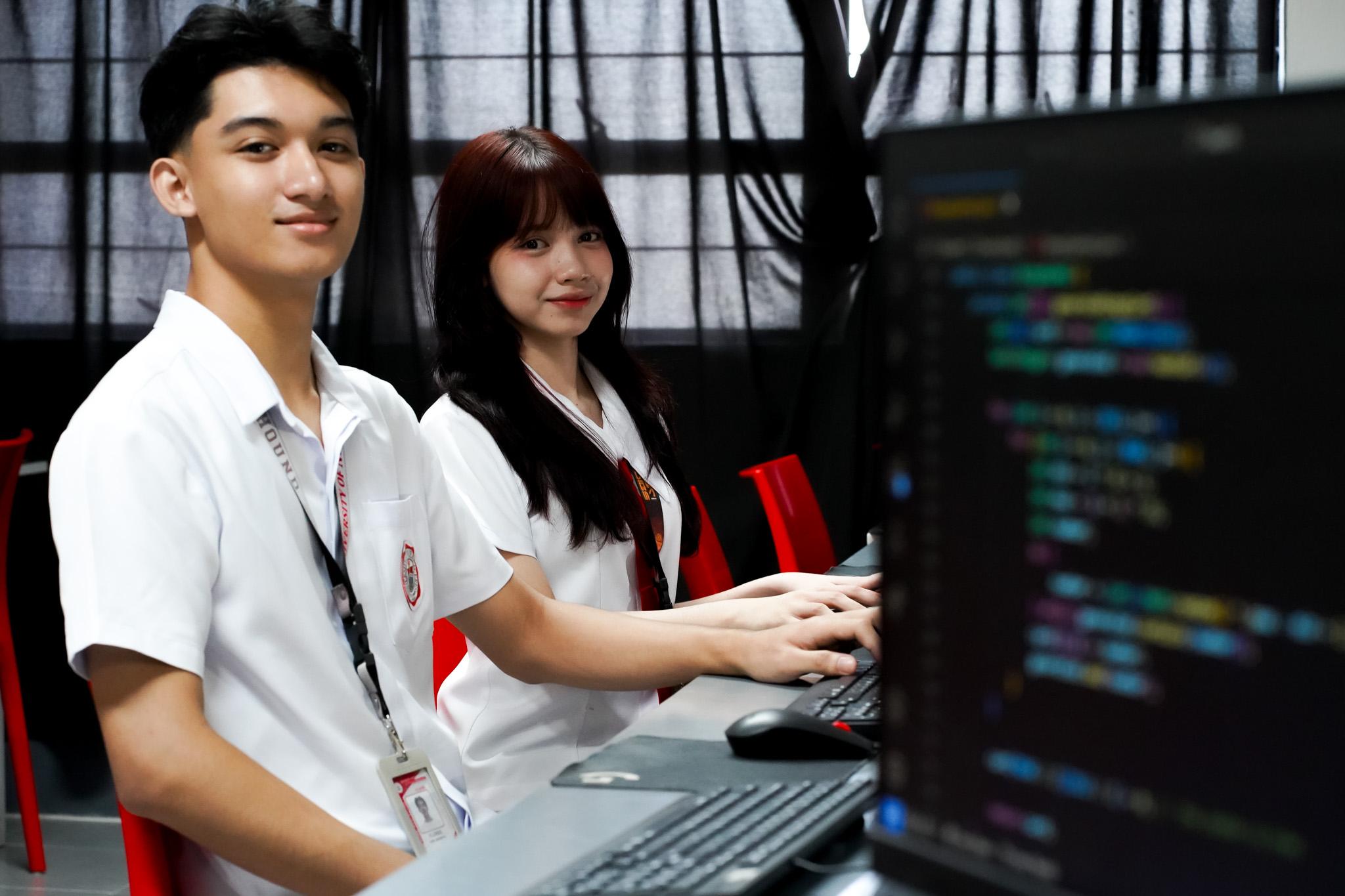
Three to five years after graduation, the BSIT alumni shall:
PO1: Apply knowledge in computing, science, and mathematics in developing IT solutions
PO2: Apply best practices and standards in developing IT solutions
PO3: Define the computing requirements appropriate to the solution of a complex problem
PO4: Analyze user needs in the selection, creation, evaluation and administration of computer-based systems
PO5: Develop IT solutions to meet the needs and requirements under various constraints
PO6: Integrate IT-based solutions into the user environment
PO7: Apply knowledge through the use of current techniques, skills, tools, and practices necessary for the IT profession
PO8: Function effectively as a member or leader of the development team recognizing the different roles to accomplish a common goal
PO9: Provide technical assistance in the creation of an effective IT project plan
PO10: Communicate effectively, both oral and written with the computing community and society
PO11: Analyze the local and global impact of computing information technology on individuals, organization and society
PO12: Apply appropriate professional, ethical, and legal practices in the utilization of information technology
PO13: Develop the skills needed to engage in independent and lifelong learning

Three to five years after graduation, Computer Science alumni shall:
PO1: Apply knowledge of computing fundamentals, specialization, and domain knowledge in the conceptualization of computing solutions from defined problems and requirements.
PO2: Formulate solutions for complex computing problems and requirements using fundamental principles of mathematics, computing sciences, and relevant domain principles based on literature
PO3: Apply mathematical foundation, algorithmic principles, and computing theories in the modeling and design of computing solutions.
PO4: Identify the information security issues in relation to the design and development of computer-based systems.
PO5: Develop solutions for complex computing problems to meet specified needs with appropriate consideration to cultural, societal, and environmental considerations.
PO6: Apply appropriate techniques, resources, and modern computing tools to solve complex computing activities.
PO7: Function effectively as a member or leader of the development team recognizing the different roles to accomplish a common goal
PO8: Communicate effectively, both oral and written, with the computing community and society.
PO9: Apply appropriate professional, ethical, and legal practices in the utilization of computer technology.
PO10: Develop the skills needed to engage in independent and lifelong learning.
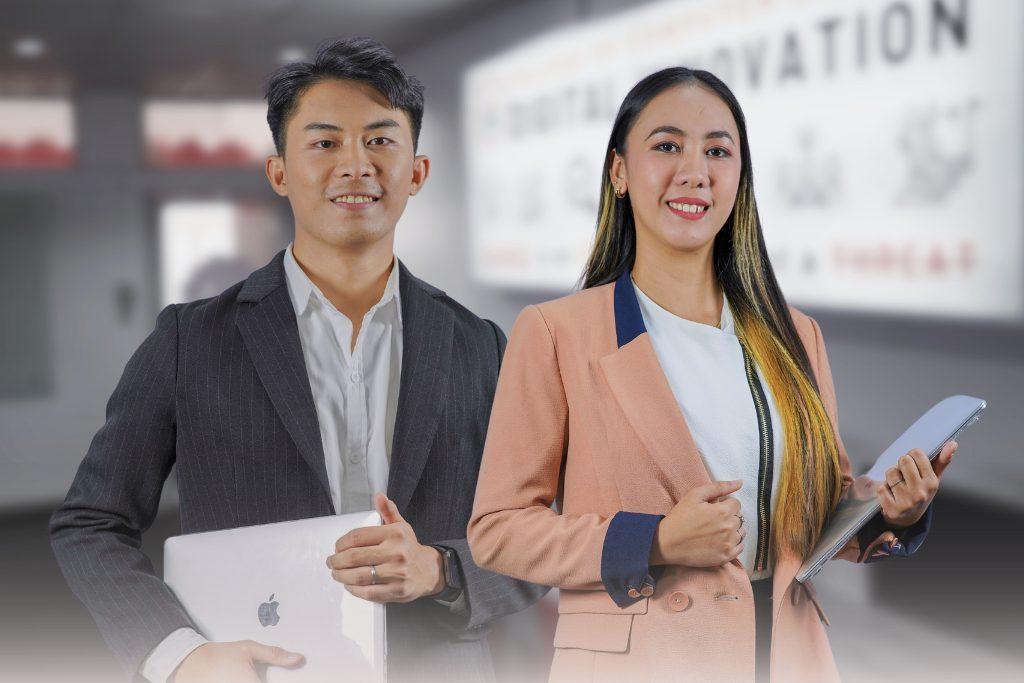
Three to five years after graduation, LIS alumni shall:
PO1: Select, evaluate, organize, and disseminate print, multimedia, electronic and digital information resources
PO2: Communicate effectively, both oral and written, using appropriate levels of discourse.
PO3: Demonstrate logical and systematic approaches to the accomplishment of tasks
PO4: Formulate objectives, policies and processes as well as design and manage resources in anticipation of future educational or organizational changes.
PO5: Propose effective library information science-based solutions appropriate to identified problems and requirements.
PO6: Identify the information needs of the users to be able to evaluate and improve the practices and services of the library
PO7: Work well in groups and seek ways to build team efforts toward solving problems and achieving common goals
PO8: Determine the different library automation systems and the use of computer hardware, software, and peripherals for library use
PO9: Develop information technology solutions for libraries.
PO10: Conduct significant research projects that will benefit the library and the organization.
PO11: Evaluate information policy and ethical issues applicable in local, national or global context.
PO12: Participate in continuing education activities organized by library associations and other entities

Bachelor of Science in Business Administration major in Financial Management
Bachelor of Science in Business Administration major in Marketing Management
Bachelor of Science in Business Administration major in Human Resource Management
Bachelor of Science in Business Administration major in Operations Management
Bachelor of Science in Business Administration major in Digital Marketing
Practice one’s career as ethically and socially responsible professionals who contribute to uphold the UNC core values
Contribute to nation-building by assuming leadership responsibilities and demonstrating competencies required in Marketing and allied fields.
By the time of graduation, the students of the BSBA program shall have the ability to:
| PO a | Communicate clearly and effectively with stakeholders both in oral and written forms. |
| PO b | Work effectively and independently in multi-disciplinary and multi-cultural teams (PQF level 6 descriptor) |
| PO c | Promote “Filipino historical and cultural heritage” (based on RA 7722) |
| PO d | Act in recognition of personal and professional development |
| PO e | Implement business-related activities by applying the basic functions of management and basic concepts that underlie in each of the functional areas of business (marketing, finance, human resource, production/operation) |
| PO f | Conduct business research, as a tool to critically, analytically and creatively solve problems and drive results |
| PO g | Employ technology as a business tool in capturing financial and non-financial information, generating reports and making decisions. |
| PO h | Apply knowledge and skills to successfully respond to various types of assessments, e.g. certifications. |
| PO i | Analyze the business environment to innovate business ideas based on emerging industry. |
| PO j | Maintain a commitment to good corporate citizenship, social responsibility and ethical practice in the conduct of business or profession. |

Within three to five years, graduates of BS Entrepreneurship program are expected to:
By the time of graduation, the students of the BSENTREP program shall have the ability to:
| PO a | Communicate clearly and effectively with stakeholders both in oral and written forms. |
| PO b | Work effectively and independently in multi-disciplinary and multi-cultural teams (PQF level 6 descriptor) |
| PO c | Promote “Filipino historical and cultural heritage” (based on RA 7722) |
| PO d | Scan and analyze the environment to determine business opportunities and develop their profitability profiles from which entrepreneurial ventures can be selected from. |
| PO e | Operate and manage an enterprise by mobilizing the necessary human, financial, logistical, and technical requirements based on the prepared business plan, and compliant with requirements for business operation. |
| PO f | Apply entrepreneurial management in any organization other than your own enterprise and technology skills as required by the business environment. |
| PO g | Maintain a commitment to good corporate citizenship, social responsibility and ethical practice in the conduct of business. |
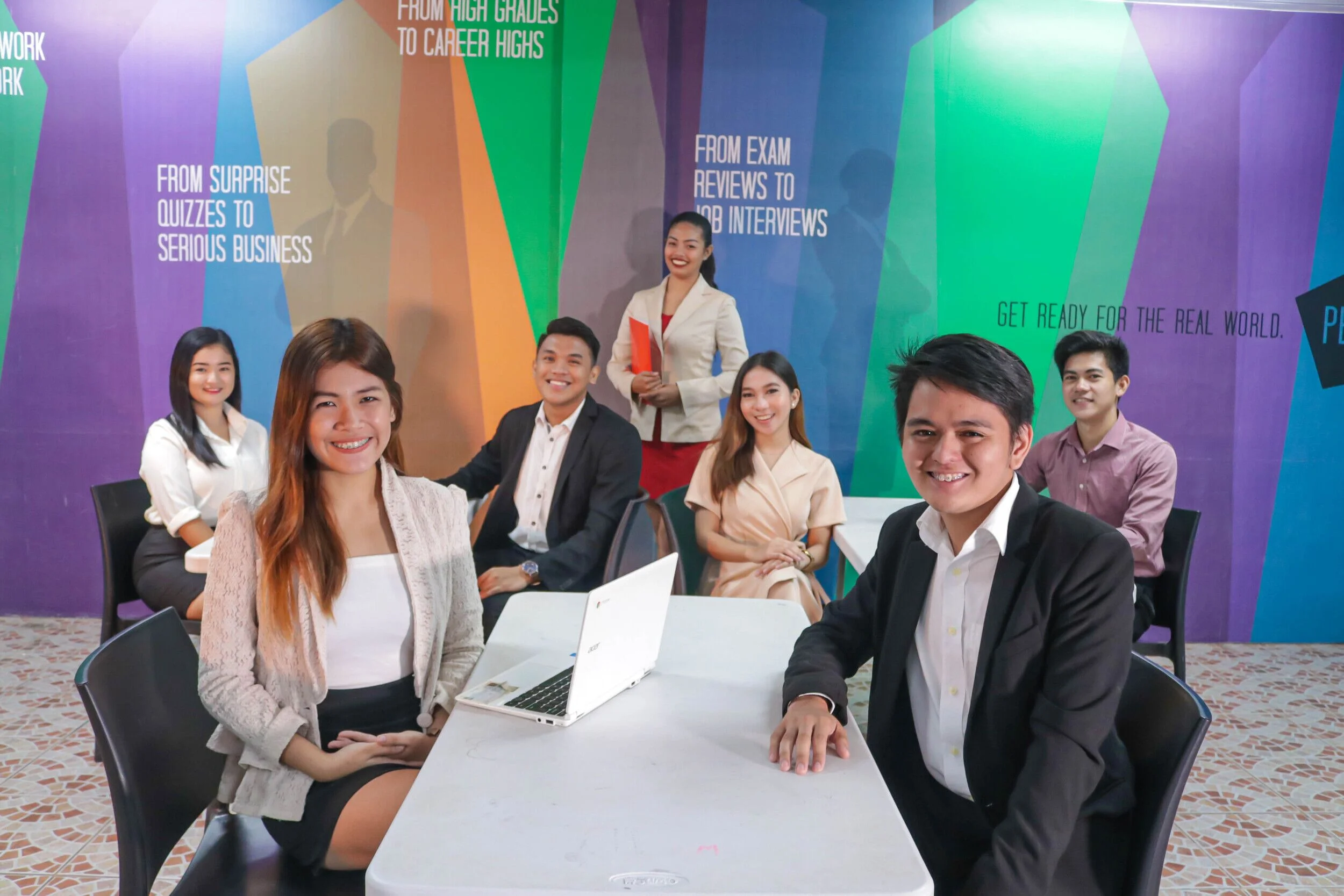
Within three to five years, graduates of BSHM Program should have
1. Become successful hospitality professionals who can help in the growth of the tourism industry.
2. Demonstrate managerial competencies that are needed to execute tasks in the hospitality industry, and one who consistently strive for excellence in everything that they will do.
3. Promote professionalism in the hospitality practice
By the time of graduation, the students of the BS HOSPITALITY MANAGEMENT AND BS TOURISM MANAGEMENT program shall have the ability to:
| POa | Communicate clearly and effectively with stakeholders both in oral and written forms. |
| POb | Work effectively and independently in multi-disciplinary and multi-cultural teams (PQF level 6 descriptor) |
| POc | Act in recognition of personal and professional development |
| POd | Promote “Filipino historical and cultural heritage” (based on RA 7722) |
| POe | Implement business- related activities by applying the basic functions of management and basic concepts that underlie in each of the functional areas of business (marketing, finance, human resource, production/operation) |
| POf | Produce and manage food products and services complying with enterprise standards |
| POg | Apply management skills in F & B service and operations |
| POh | Implement and evaluate MICE activities |
| POi | Perform various housekeeping services for guest and facility operations |
| POj | Plan and implement a risk management program to provide a safe and secure workplace |
| POk | Provide food & beverage service and manage the operation seamlessly based on industry standards |
| POl | Maintain a commitment to good corporate citizenship, social responsibility and ethical practice in performing function as part of the hospitality industry |
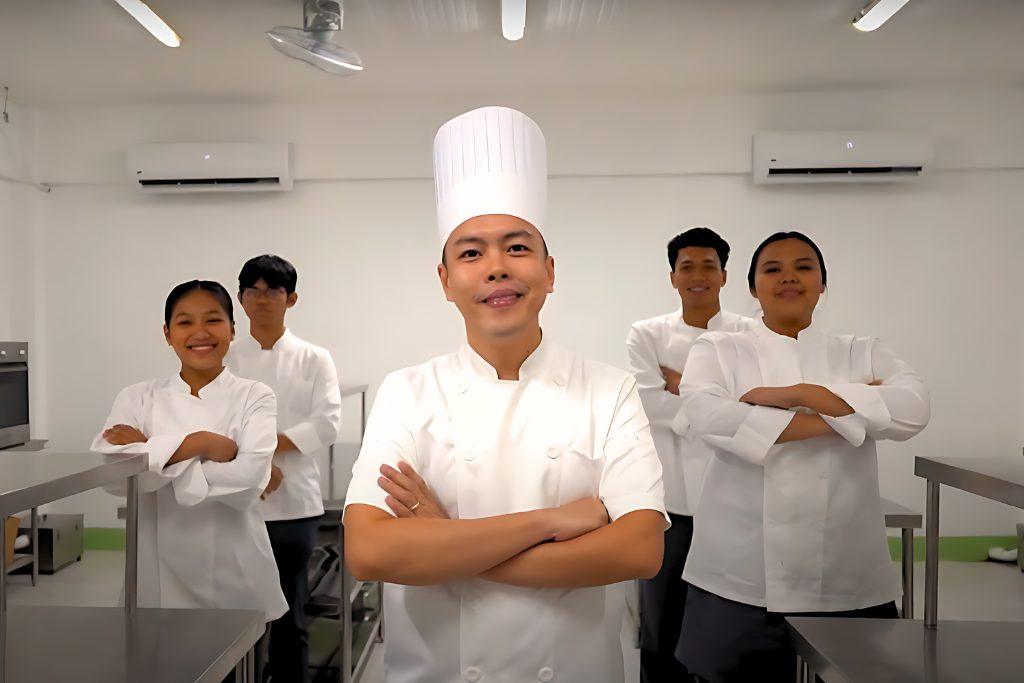
Within three to five years, graduates of BSTM Program should have
1. Become successful hospitality professionals who can help in the growth of the tourism industry.
2. Demonstrate managerial competencies that are needed to execute tasks in the hospitality industry, and one who consistently strive for excellence in everything that they will do.
3. Promote professionalism in the hospitality practice
By the time of graduation, the students of the BS TOURISM MANAGEMENT program shall have the ability to:
| POa | Communicate clearly and effectively with stakeholders both in oral and written forms. |
| POb | Work effectively and independently in multi-disciplinary and multi-cultural teams (PQF level 6 descriptor) |
| POc | Act in recognition of personal and professional development |
| POd | Promote “Filipino historical and cultural heritage” (based on RA 7722) |
| POe | Implement business- related activities by applying the basic functions of management and basic concepts that underlie in each of the functional areas of business (marketing, finance, human resource, production/operation) |
| POf | Produce and manage food products and services complying with enterprise standards |
| POg | Apply management skills in F & B service and operations |
| POh | Implement and evaluate MICE activities |
| POi | Perform various housekeeping services for guest and facility operations |
| POj | Plan and implement a risk management program to provide a safe and secure workplace |
| POk | Provide food & beverage service and manage the operation seamlessly based on industry standards |
| POl | Maintain a commitment to good corporate citizenship, social responsibility and ethical practice in performing function as part of the hospitality industry |
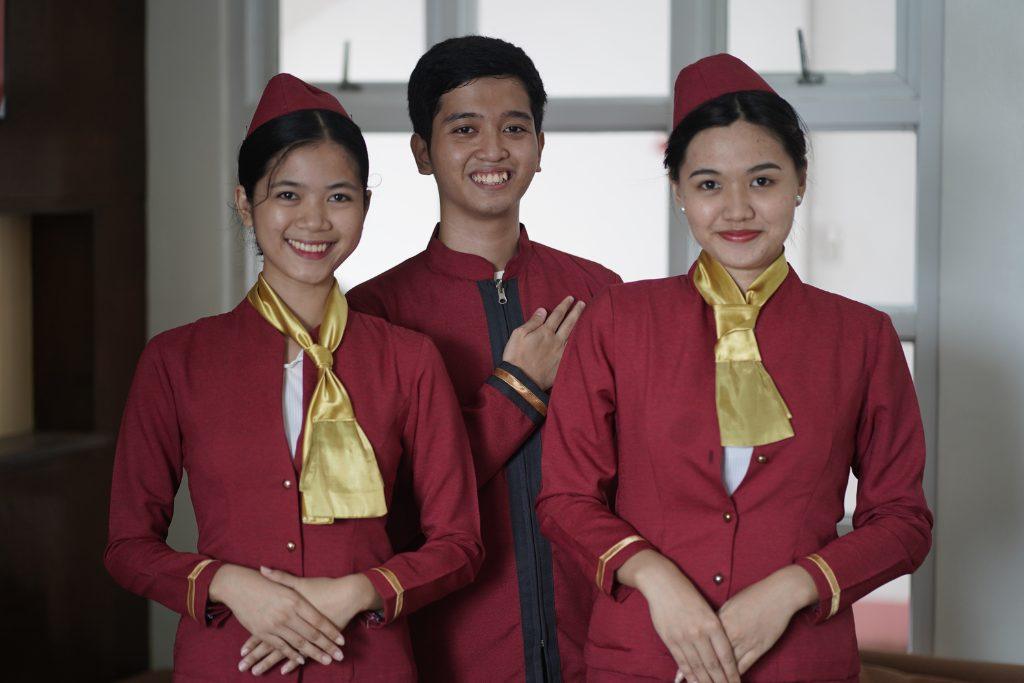
By the time of graduation, the students of the BS Accountancy program shall have the ability to:
| PO a | Communicate clearly and effectively with stakeholders both in oral and written forms. |
| PO b | Work effectively and independently in multi-disciplinary and multi-cultural teams (PQF level 6 descriptor) |
| PO c | Promote “Filipino historical and cultural heritage” (based on RA 7722) |
| PO d | Act in recognition of personal and professional development |
| PO e | Implement business- related activities by applying the basic functions of management and basic concepts that underlie in each of the functional areas of business (marketing, finance, human resource, production/operation) |
| PO f | Resolve business issues and problems, with global perspective and particular emphasis on matters confronting financial statement preparers and users, using their knowledge and technical proficiency in the areas of financial accounting, cost accounting, management accounting, auditing, taxation, business laws, regulatory framework for business transactions, accounting information systems and other related areas. |
| PO g | Conduct accounting research, as a tool to critically, analytically and creatively solve problems and drive results |
| PO h | Employ technology as a business tool in capturing financial and non-financial information, generating reports and making decisions. |
| PO i | Apply knowledge and skills to successfully respond to various types of assessments (including professional licensure and certifications |
| PO j | Maintain a commitment to good corporate citizenship, social responsibility and ethical practice in performing function as accountants |
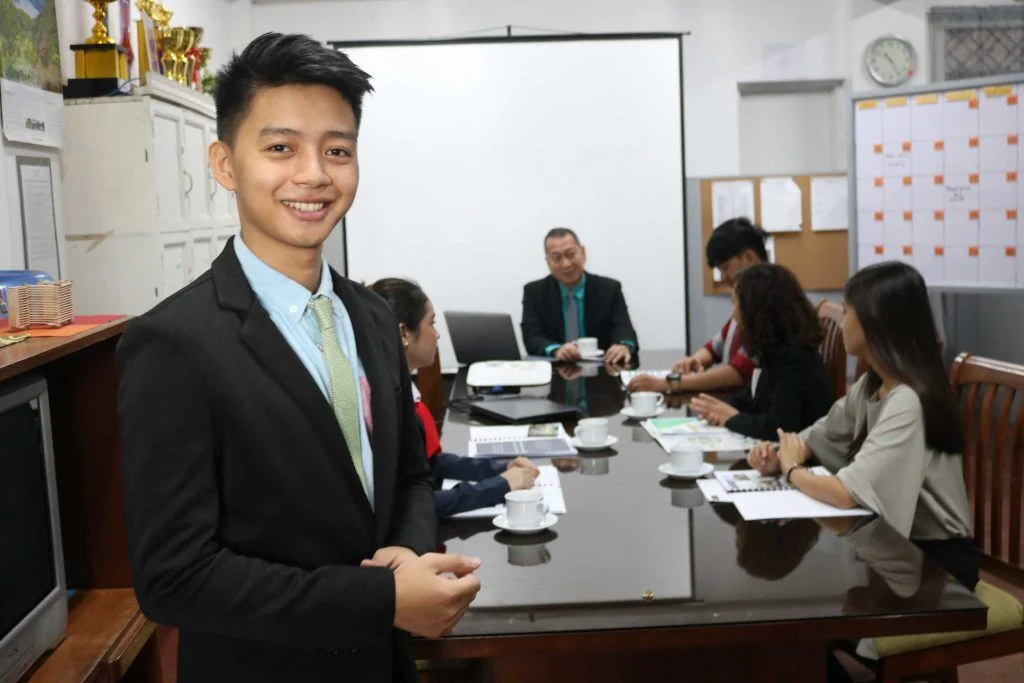
The Expanded Tertiary Education Equivalency and Accreditation Program of UNC College of Business and Accountancy envisions its graduates to attain specialized learning with improved managerial and entrepreneurial skills, and responsive to the demands of the global business environment.
To develop globally competitive and competent professionals in various business fields through the provision of appropriate curricular programs that will transform individuals into competent and proactive professionals and entrepreneurs possessed with competence, integrity, and moral and social responsibility.
The expanded tertiary Education Equivalency and Accreditation Program (ETEEAP) of the University of Nueva Caceres has the following objectives:
1.To accredit and assess prior formal, non-formal and informal learning of individuals towards the granting of equivalency certificates in higher education.
2.To fully develop the system of equivalency and accreditation in higher education as a bridging mechanism for the flexible entry and exchange between the formal and the non-formal and informal systems of higher learning.
3.To enable individuals to have access to higher-value jobs and wider career opportunities.
4.To implement the accreditation and equivalency program in Bachelor of Science in Business Administration major in: Financial Management, Marketing Management, Operations Management, and Human Resource Development Management.
5.To award higher education degrees to deserving applicants in the ETEEAP.
The ETEEAP of the UNC implements the following policies:
1. Adheres to the principles of truth, wisdom and knowledge for the service of God, country and humanity.
2.Ensures the highest standards of quality that are acceptable to employees and academe, consistent with standards of practice of professions.
3.Provides non-discrimination entry of participants in the program.
4.Ensures fairness, creativity and appropriateness of the assessment process.
5.Ensures that formation programs of the University are implemented in the ETEEAP.
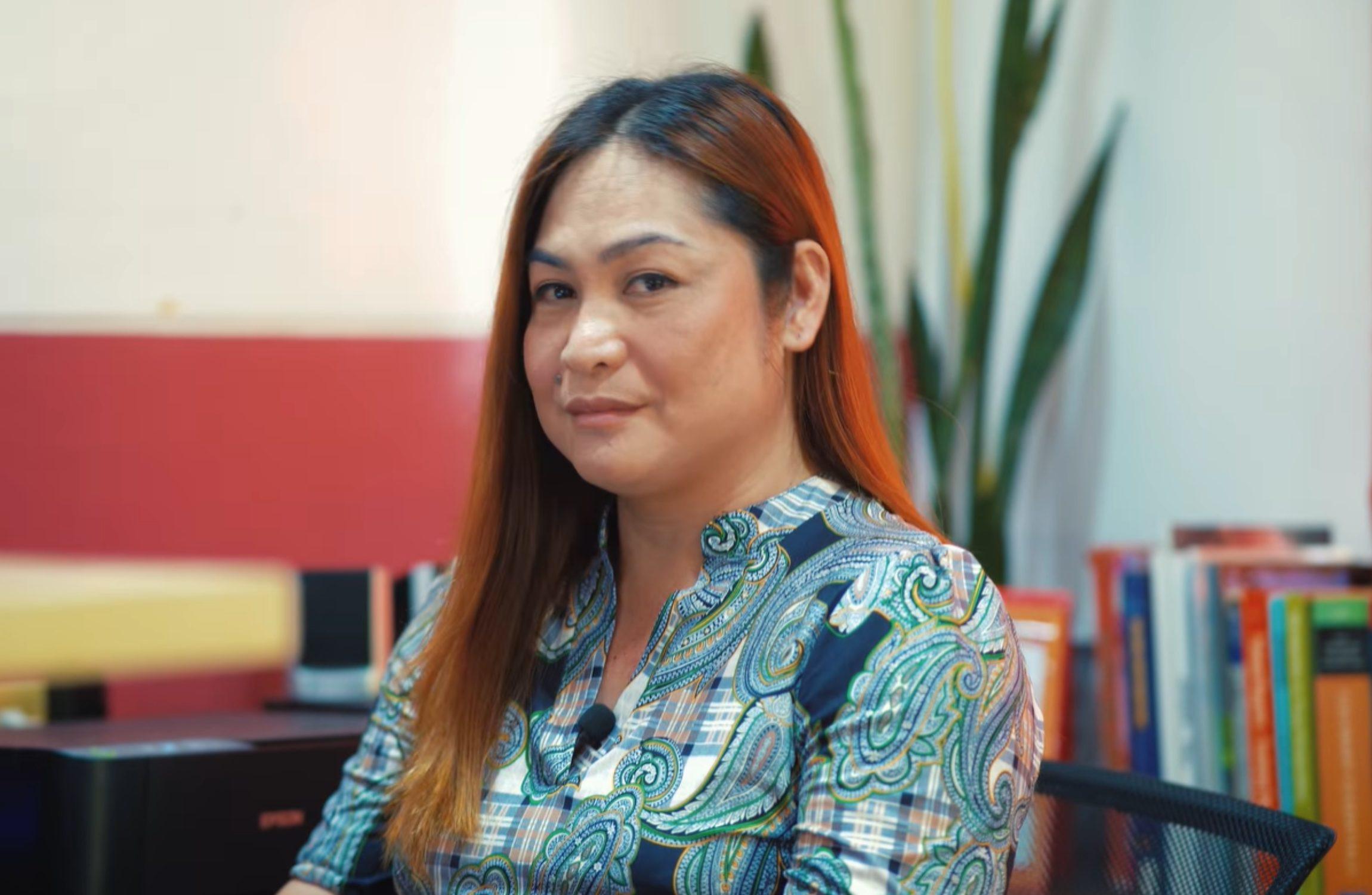
Within three to five years graduates of BS Biology should be able to:
a. Develop an in-depth understanding of the basic principles governing the science of life;
b. Utilize techniques/procedures relevant to biological research work in laboratory or field settings;
c. Apply basic mathematical and statistical computations and use of appropriate technologies in the analysis of biological data;
d. Extend knowledge and critically assess current views and theories in various areas of the biological sciences.
By the time of graduation, the students of the AB Political Science program shall have the ability to:
a. Classify the major concepts in the discipline;
b. Define the distinctiveness of the discipline, its subfields, theories and methods;
c. Conduct research using appropriate quantitative and qualitative methods guided by theories or conceptual
frameworks;
d. Demonstrate written, visual and oral presentation skills to produce reports;
e. Critique current issues based on substantive understanding of the historical and contemporary developments in
the national and global contexts;
f. Develop a predisposition towards ethical political involvement and practice in various forms.
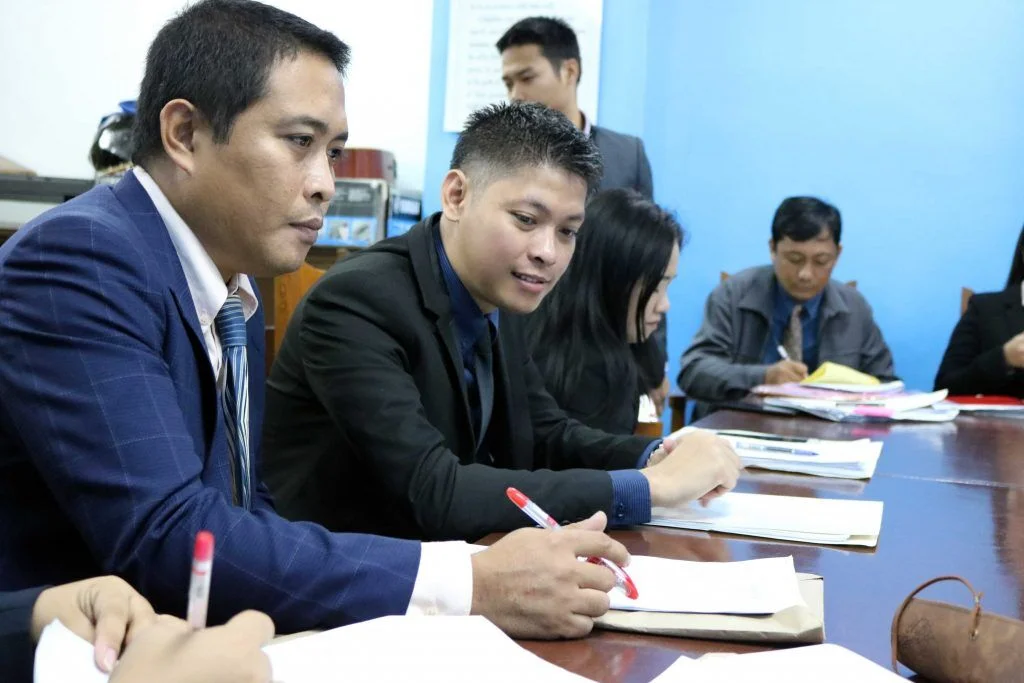
Graduates of Bachelor of Arts in Political Science Program should be able to:
1. Acquire a comprehensive grasp of the distinctive concepts, aspects and sub-fields of Political Science as well as their application in the social and political spheres.
2. Develop a drive to participate in public affairs and in current issues, commitment to upholding democracy, vigilance in the protection of rights and a deep devotion to the country.
By the time of graduation, the students of the AB Political Science program shall have the ability to:
a. Classify the major concepts in the discipline;
b. Define the distinctiveness of the discipline, its subfields, theories and methods;
c. Conduct research using appropriate quantitative and qualitative methods guided by theories or conceptual
frameworks;
d. Demonstrate written, visual and oral presentation skills to produce reports;
e. Critique current issues based on substantive understanding of the historical and contemporary developments in
the national and global contexts;
f. Develop a predisposition towards ethical political involvement and practice in various forms.

Within three to five years, graduates of AB Psychology Program should have:
1. Possessed wholistic expertise so that they are competent to hold positions in professional practice or research and become expert in psychological field;
2. Acquired competences needed to be globally competitive and continuously adapt to the changes and advancement in their field of psychology.
By the time of graduation, the students of the AB Political Science program shall have the ability to:
a. Demonstrate and apply the methods of psychological inquiry in building knowledge on the local culture and context (psychological research).
b. Demonstrate and apply psychological theories and methods in the personal and professional; setting (application of psychology).
c. Demonstrate capability for self-reflection and independent learning in graduate education or in a professional context (independent learning).
d. Demonstrate professional and ethical behaviors in research and practice in Psychology (ethics)










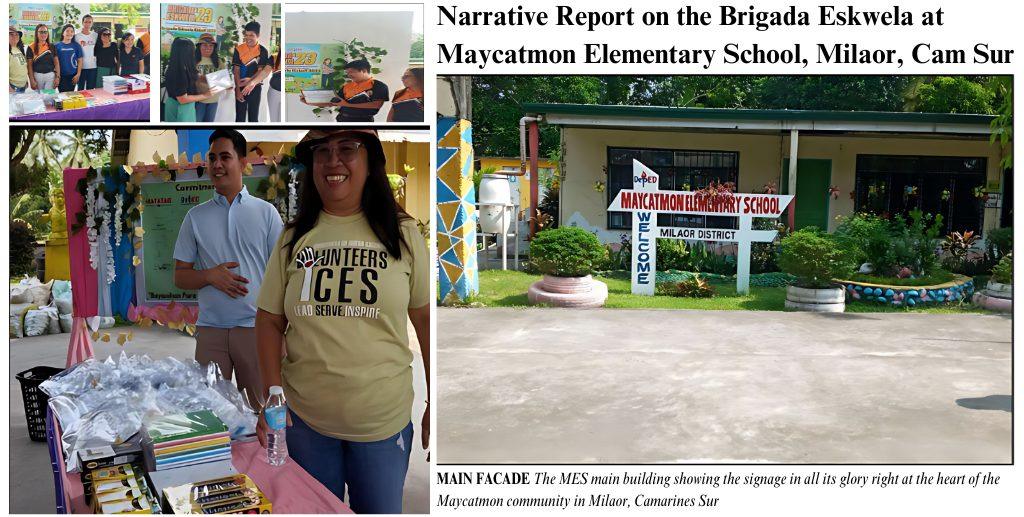

[ ] Verification Slip (Accounting Office Window 5)
[ ] Previous Semester Grades (Registrar’s Office)
[ ] Supporting documents if there are changes in profile
